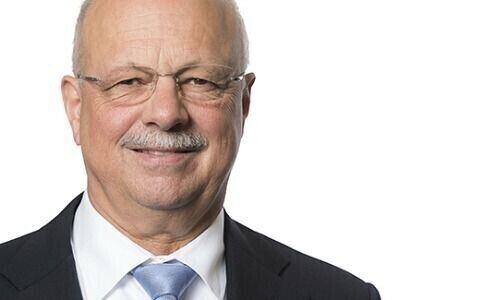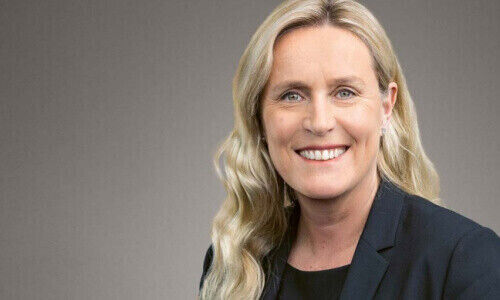Konrad Hummler: «The Modern Bank Run – Rapid and Brutal»
The global financial system remains latently unstable post-Credit Suisse; new crises can hit anyone and everyone. This represents a challenge to central bankers and regulators – what is needed is a new architecture adapted to dramatically lower information and transaction costs, Konrad Hummler writes in an article on finews.first.
This article is published on finews.first, a forum for authors specializing in economic and financial topics.
Since the inglorious demise of one of the two major Swiss banks, the once proud Credit Suisse, the global financial community has been enriched by an important experience: the modern, globally effective bank run. It contrasts hugely with the almost tranquil images of long queues in front of venerable bank buildings in London as creditors tried to save what was left of their assets in cash.
The modern bank run takes place invisibly in the electronic-virtual sphere. It has neither open-counter hours nor banknote logistics and makes no material distinction between account balances – which are indeed at risk – and privileged deposit holdings. The modern bank run is radical and takes place within a very brief timespan thanks to social media and other means of communication. A few days are enough to empty a bank and render its continued existence unthinkable.
«Credit Suisse's risk premiums could hardly be controlled any longer»
It hit the undoubtedly right institution. At the latest since the bad news about the Greensill conglomerate, it was clear that the many previous promises of business-political rectification were smoke and mirrors. Credit Suisse's risk premiums could hardly be controlled any longer, and it was foreseeable that even minor shocks in the banking system would have serious repercussions for the embattled bank.
But everyone, first and foremost the recently appointed new Credit Suisse management, but also the supervisory authority Finma and the Swiss National Bank as lender of last resort, had completely underestimated the speed of a modern bank run. Foreign banks and authorities were equally shocked, especially in the USA, where the banking crisis of 2023 had originated.
«There was probably no alternative to this unique Credit Suisse rescue, involving the far healthier UBS»
In view of the impending CS catastrophe, there were fears of a global financial crisis with multiple victims among banks that certainly deserved to survive. There was probably no alternative to this unique Credit Suisse rescue, involving the far healthier UBS and under the strict orders of Swiss Finance Minister Karin Keller-Sutter.
However, the problem of the radicality and speed of the modern bank run remains. For rumors would presumably be enough to shake even solid banks to their foundations. Two or three unfavorable comments on business conduct and the balance sheet, a few minor personal scandals, high management salaries... The global financial system remains latently unstable post-Credit Suisse; new crises can hit anyone and everyone. This represents a challenge to central bankers and regulators – what is needed is a new architecture adapted to dramatically lower information and transaction costs.
«Until that happens, the financial system and thus the banks will remain at risk»
At the moment, all I see is the following: either we find ways to geographically or materially contain a banking problem («containment»), or we must delineate a sharper separation between central bank money and the commercial money created by the banks. Payment transactions and ordinary savings would then have to be reserved for secure «full money banks», all the rest for a banking community beyond state guarantees and too-big-to-fail ideas («segregation»).
At least one thing is certain: until that happens, the financial system and thus the banks will remain at risk.
Konrad Hummler joined what today is known as UBS after his law studies. He was a member of staff of then-Chairman Robert Holzach. In 1989, Hummler together with partners took charge of Wegelin, a Swiss private bank that folded during the Swiss dispute with U.S. authorities on the treatment of untaxed assets. After this incisive event, Hummler started anew. He founded M1, a think tank for strategic questions. Today, the former private banker has several mandates. He is the chairman of Private Client Bank in Zurich.
Previous contributions: Rudi Bogni, Peter Kurer, Rolf Banz, Dieter Ruloff, Werner Vogt, Walter Wittmann, Alfred Mettler, Robert Holzach, Craig Murray, David Zollinger, Arthur Bolliger, Beat Kappeler, Chris Rowe, Stefan Gerlach, Marc Lussy, Nuno Fernandes, Richard Egger, Maurice Pedergnana, Marco Bargel, Steve Hanke, Urs Schoettli, Ursula Finsterwald, Stefan Kreuzkamp, Oliver Bussmann, Michael Benz, Albert Steck, Martin Dahinden, Thomas Fedier, Alfred Mettler, Brigitte Strebel, Mirjam Staub-Bisang, Nicolas Roth, Thorsten Polleit, Kim Iskyan, Stephen Dover, Denise Kenyon-Rouvinez, Christian Dreyer, Kinan Khadam-Al-Jame, Robert Hemmi, Anton Affentranger, Yves Mirabaud, Katharina Bart, Frédéric Papp, Hans-Martin Kraus, Gerard Guerdat, Mario Bassi, Stephen Thariyan, Dan Steinbock, Rino Borini, Bert Flossbach, Michael Hasenstab, Guido Schilling, Werner E. Rutsch, Dorte Bech Vizard, Adriano B. Lucatelli, Katharina Bart, Maya Bhandari, Jean Tirole, Hans Jakob Roth, Marco Martinelli, Thomas Sutter, Tom King, Werner Peyer, Thomas Kupfer, Peter Kurer, Arturo Bris, Frederic Papp, James Syme, Dennis Larsen, Bernd Kramer, Armin Jans, Nicolas Roth, Hans Ulrich Jost, Patrick Hunger, Fabrizio Quirighetti, Claire Shaw, Peter Fanconi, Alex Wolf, Dan Steinbock, Patrick Scheurle, Sandro Occhilupo, Will Ballard, Nicholas Yeo, Claude-Alain Margelisch, Jean-François Hirschel, Jens Pongratz, Samuel Gerber, Philipp Weckherlin, Anne Richards, Antoni Trenchev, Benoit Barbereau, Pascal R. Bersier, Shaul Lifshitz, Klaus Breiner, Ana Botín, Martin Gilbert, Jesper Koll, Ingo Rauser, Carlo Capaul, Markus Winkler, Konrad Hummler, Thomas Steinemann, Christina Boeck, Guillaume Compeyron, Miro Zivkovic, Alexander F. Wagner, Eric Heymann, Christoph Sax, Felix Brem, Jochen Moebert, Jacques-Aurélien Marcireau, Ursula Finsterwald, Michel Longhini, Stefan Blum, Zsolt Kohalmi, Karin M. Klossek, Nicolas Ramelet, Søren Bjønness, Gilles Prince, Salman Ahmed, Peter van der Welle, Ken Orchard, Christian Gast, Jeffrey Bohn, Juergen Braunstein, Jeff Voegeli, Fiona Frick, Stefan Schneider, Matthias Hunn, Andreas Vetsch, Fabiana Fedeli, Kim Fournais, Carole Millet, Swetha Ramachandran, Thomas Stucki, Neil Shearing, Tom Naratil, Oliver Berger, Robert Sharps, Tobias Mueller, Florian Wicki, Jean Keller, Niels Lan Doky, Karin M. Klossek, Johnny El Hachem, Judith Basad, Katharina Bart, Thorsten Polleit, Peter Schmid, Karam Hinduja, Zsolt Kohalmi, Raphaël Surber, Santosh Brivio, Mark Urquhart, Olivier Kessler, Bruno Capone, Peter Hody, Michael Bornhaeusser, Agnieszka Walorska, Thomas Mueller, Ebrahim Attarzadeh, Marcel Hostettler, Hui Zhang, Michael Bornhaeusser, Reto Jauch, Angela Agostini, Guy de Blonay, Tatjana Greil Castro, Jean-Baptiste Berthon, Marc Saint John Webb, Dietrich Goenemeyer, Mobeen Tahir, Didier Saint-Georges, Serge Tabachnik, Vega Ibanez, David Folkerts-Landau, Andreas Ita, Michael Welti, Mihkel Vitsur, Fabrizio Pagani, Roman Balzan, Todd Saligman, Christian Kaelin, Stuart Dunbar, Carina Schaurte, Birte Orth-Freese, Gun Woo, Lamara von Albertini, Ramon Vogt, Andrea Hoffmann, Niccolò Garzelli, Darren Williams, Benjamin Böhner, Mike Judith, Jared Cook, Henk Grootveld, Roman Gaus, Nicolas Faller, Anna Stünzi, Thomas Höhne-Sparborth, Fabrizio Pagani, Guy de Blonay, Jan Boudewijns, Sean Hagerty, Alina Donets, Sébastien Galy, Roman von Ah, Fernando Fernández, Georg von Wyss, Stefan Bannwart, Andreas Britt, Frédéric Leroux, Nick Platjouw, Rolando Grandi, Philipp Kaupke, Gérard Piasko, Brad Slingerlend, Dieter Wermuth, Grégoire Bordier, Thomas Signer, Brigitte Kaps, Gianluca Gerosa, Christine Houston, Manuel Romera Robles, Fabian Käslin, Claudia Kraaz, Marco Huwiler, Lukas Zihlmann, Nadège Lesueur-Pène, Sherif Mamdouh, Harald Preissler, Taimur Hyat, Philipp Cottier, Andreas Herrmann, Camille Vial, Marcus Hüttinger, Ralph Ebert, Serge Beck, Alannah Beer, Stéphane Monier, Ashley Simmons, Lars Jaeger, Claude Baumann, Shanna Strauss-Frank, Bertrand Binggeli, Marionna Wegenstein, George Muzinich, Jian Shi Cortesi, Razan Nasser, Nicolas Forest, Joerg Ruetschi, Reto Jauch, Bernardo Brunschwiler, Charles-Henry Monchau, Philip Adler, Brigitte Kaps, Ha Duong, Teodoro Cocca, Beat Wittmann, Jan Brzezek, Florin Baeriswyl, Nicolas Mousset, Beat Weiss, Pascal Mischler, and Andrew Isbester.
























